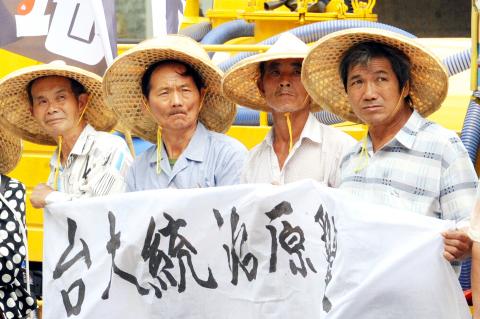Hundreds of farmers from across the country yesterday staged a rally in Taipei to protest against the government’s “arbitrary regulations” that deprive them of their right of abode and their livelihood.
The parade started from the Council of Agriculture’s Forestry Bureau and ended at Ketagalan Boulevard in front of the Presidential Office.
Holding banners that read: “Give us back our land,” the protesters, many of whom were elderly farmers, appealed to the government to allow them to continue growing fruit and crops on the land that they have cultivated for years, instead of restraining their right of abode by designating these areas as national parks.

Photo: George Tsorng, Taipei Times
Tseng Te-tsung (曾得總), general-director of the parade and chairperson of Taiwan Original Cultivation Farmers’ Association, said many of the farmers and their families had been farming their lands since the Japanese colonial era (from 1895 to 1945) or long before that.
However, when the Chinese Nationalist Party (KMT) government took over from the Japanese colonial government, it arbitrarily designated large tracts of the land as national parks and placed them under state ownership, Tseng said.
A fruit farmer surnamed Chen (陳) from Greater Kaohsiung’s Tianliao District (田寮) said: “We farmers don’t ask for a wealthy life, but when the government takes our land, it not only deprives us of our possessions, but also puts us out of work.”
Chen accused the government of violating the Constitution, which guarantees protection of people’s right of habitation and livelihood.
He added that the government should assist self-farming land owners and people who live on the land when planning and redistributing land resources.
Many farmers don’t understand the law that protects their rights and many were not given the chance to apply and register for ownership over the land, he said.
Many farmers are only allowed to temporarily rent the farmlands that they have been living on for decades, he said.
A fruit farmer surnamed Tsai (蔡), having been forced to tear down many parts of his house already, said he was recently fined another NT$120,000 for occupying state-owned property.
He said the government has been bullying farmers for many years, but all they ask for is the legitimacy to continue farming and living on the land.
The farmers urged the government to rethink its land redistribution policy instead of arbitrarily driving out those who have lived on the land for years or accusing them of breaking the law.
Taiwan Solidarity Union Chairman Huang Kun-huei (黃昆輝), who took part in the protest, said the government was wrong to dispossess farmers of the land and prosecute them for occupying state land.
“If these cases continue to happen, it will only generate hatred among the people,” he said.
In a statement released last night, the Forestry Bureau said: “The management of national parks and related measures will be modified in consideration of the farmers.”
“Standard acts of changing national parks into private land will be discussed with other related government agencies,” it added.

The Mainland Affairs Council (MAC) today condemned the Chinese Communist Party (CCP) after the Czech officials confirmed that Chinese agents had surveilled Vice President Hsiao Bi-khim (蕭美琴) during her visit to Prague in March last year. Czech Military Intelligence director Petr Bartovsky yesterday said that Chinese operatives had attempted to create the conditions to carry out a demonstrative incident involving Hsiao, going as far as to plan a collision with her car. Hsiao was vice president-elect at the time. The MAC said that it has requested an explanation and demanded a public apology from Beijing. The CCP has repeatedly ignored the desires

Many Chinese spouses required to submit proof of having renounced their Chinese household registration have either completed the process or provided affidavits ahead of the June 30 deadline, the Mainland Affairs Council (MAC) said on Thursday. Of the 12,146 people required to submit the proof, 5,534 had done so as of Wednesday, MAC deputy head and spokesperson Liang Wen-chieh (梁文傑) said. Another 2,572 people who met conditions for exemption or deferral from submitting proof of deregistration — such as those with serious illnesses or injuries — have submitted affidavits instead, he said. “As long as individuals are willing to cooperate with the legal

The Ma-anshan Nuclear Power Plant’s license has expired and it cannot simply be restarted, the Executive Yuan said today, ahead of national debates on the nuclear power referendum. The No. 2 reactor at the Ma-anshan Nuclear Power Plant in Pingtung County was disconnected from the nation’s power grid and completely shut down on May 17, the day its license expired. The government would prioritize people’s safety and conduct necessary evaluations and checks if there is a need to extend the service life of the reactor, Executive Yuan spokeswoman Michelle Lee (李慧芝) told a news conference. Lee said that the referendum would read: “Do

The Ministry of Environment yesterday held a seminar in Taipei for experts from Taiwan and Japan to exchange their experiences on the designs and development of public toilets. Japan Toilet Association chairman Kohei Yamamoto said that he was impressed with the eco-toilet set up at Daan Forest Park, adding that Japan still faces issues regarding public restrooms despite the progress it made over the past decades. For example, an all-gender toilet was set up in Kabukicho in Tokyo’s Shinjuku District several years ago, but it caused a public backlash and was rebuilt into traditional men’s and women’s toilets, he said. Japan Toilet Association